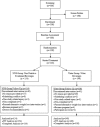The effects of water and non-nutritive sweetened beverages on weight loss and weight maintenance: A randomized clinical trial
- PMID: 26708700
- PMCID: PMC4744961
- DOI: 10.1002/oby.21327
The effects of water and non-nutritive sweetened beverages on weight loss and weight maintenance: A randomized clinical trial
Abstract
Objective: To evaluate the effects of water versus beverages sweetened with non-nutritive sweeteners (NNS) on body weight in subjects enrolled in a year-long behavioral weight loss treatment program.
Methods: The study used a randomized equivalence design with NNS or water beverages as the main factor in a trial among 303 weight-stable people with overweight and obesity. All participants participated in a weight loss program plus assignment to consume 24 ounces (710 ml) of water or NNS beverages daily for 1 year.
Results: NNS and water treatments were non-equivalent, with NNS treatment showing greater weight loss at the end of 1 year. At 1 year subjects receiving water had maintained a 2.45 ± 5.59 kg weight loss while those receiving NNS beverages maintained a loss of 6.21 ± 7.65 kg (P < 0.001 for difference).
Conclusions: Water and NNS beverages were not equivalent for weight loss and maintenance during a 1-year behavioral treatment program. NNS beverages were superior for weight loss and weight maintenance in a population consisting of regular users of NNS beverages who either maintained or discontinued consumption of these beverages and consumed water during a structured weight loss program. These results suggest that NNS beverages can be an effective tool for weight loss and maintenance within the context of a weight management program.
© 2015 The Authors, Obesity published by Wiley Periodicals, Inc. on behalf of The Obesity Society (TOS).
Figures



References
-
- Fowler SP, Williams K, Resendez RG, Hunt KJ, Hazuda HP, Stern MP. Fueling the obesity epidemic? Artificially sweetened beverage use and long‐term weight gain. Obesity (Silver Spring) 2008;16:1894‐1900. - PubMed
-
- Mosbergen D. Diet soda health risks: study says artificial sweeteners may cause weight gain, deadly diseases. 2013; http://www.huffingtonpost.com/2013/07/11/diet-soda-health-risks_n_358184.... Accessed December 7, 2013.
-
- Klatell J. Can diet soda make you gain weight? 2007; http://www.cbsnews.com/news/can‐diet‐soda‐make‐you‐gain‐weight/. Accessed December 7, 2013.
Publication types
MeSH terms
Substances
LinkOut - more resources
Full Text Sources
Other Literature Sources
Medical

